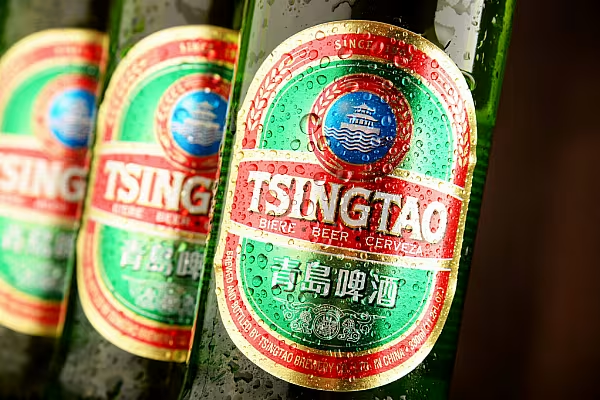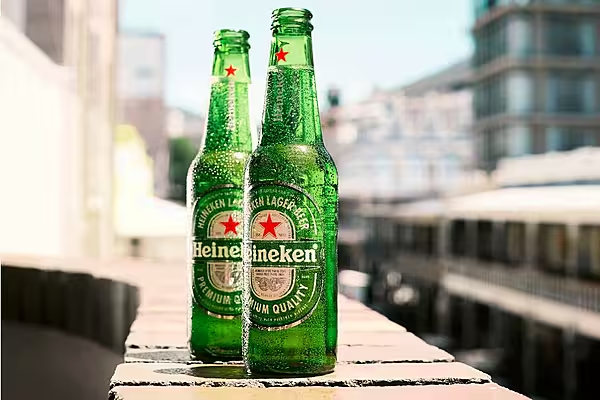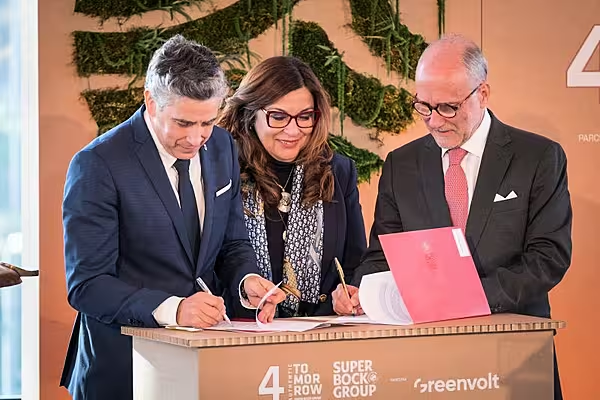For a foreign brewer hoping to gain an edge in the Chinese market, it seemed like the ideal alliance: Japan’s largest beermaker teaming up with one of China’s premier brands. Yet, Asahi Group Holdings Ltd.’s 2009 purchase of a minority stake in Tsingtao Brewery Co. didn’t produce the opportunities the Tokyo company hoped.
Eight years later, Tsingtao still doesn’t sell Asahi’s flagship “Super Dry” lager in China. On top of that, Tsingtao now faces more competition from foreign brands and local craft beers, crimping profits.
That likely prompted Asahi to seek an exit. The Japanese company picked Morgan Stanley to advise on the potential sale of its Tsingtao minority stake, people with knowledge of the matter said this week. Asahi’s 20 percent holding in Tsingtao is worth about $1.1 billion based on the current share price, data compiled by Bloomberg show.
Shares of the Chinese brewer dropped as much as 2.9 percent Friday in Hong Kong. The stock surged 6.6 percent Thursday, the biggest gain since September 2015. Asahi shares dipped as much as 0.1 percent Friday.
The sale of the Tsingtao stake would help Asahi as it pursues more acquisitions to boost its overseas business, after it agreed last year to buy about $11 billion of SABMiller Plc brands in Europe. It also comes as Chinese brewers contend with a beer market decline brought on by an economic slowdown and consumers’ palates shifting to wine.
“Asahi has concerns that the China market is not fast-growing,” said Anson Chan, an analyst Daiwa Capital Markets. “Tsingtao is already the most high-end brand among local brands in China, so it is in direct competition with foreign brands and it has been losing market share to them.”
Asahi’s plans to sell the Tsingtao holding are at an early stage, and no final decisions have been made, the people with knowledge of the matter said, asking not to be identified because the information is private. Asahi President Akiyoshi Koji said in a January interview the company will decide this year on options for its stake in the Chinese company.
Koji noted Tsingtao’s “worsened” earnings result in the interview this month. “Unfortunately, Tsingtao is not selling ‘Super Dry,’” he said. One lesson from the Tsingtao investment, he said, is that “ownership without control doesn’t make much sense.”
Representatives for Asahi and Morgan Stanley declined to comment. Tsingtao said in a Hong Kong exchange filing Thursday it will keep monitoring the situation and continue communication with Asahi. A spokesman for the Chinese brewer declined to comment beyond the statement.
“Investors are expecting Tsingtao would be able to get a new strategic partner who can inject momentum and revitalize the brand,” Steven Leung, a Hong Kong-based executive director at UOB Kay Hian, said by phone Thursday. “Asahi has been sitting on this investment for so long and hasn’t been able to give much boost to Tsingtao’s overseas expansion.”
Changing Tastes
The overall beer market in China has declined 6 percent in volume since 2013, according to Euromonitor International. Tsingtao, with about 15 percent market share, trails China Resource Beer Holdings Co.’s popular Snow brand, which had 22 percent of the China market in 2015, Euromonitor data show.
As the Chinese economy slows, mid-market brands like Tsingtao are squeezed, according to Shaun Rein, managing director of China Market Research Group. Some consumers are looking for lower-priced beers, he said, while more affluent Chinese are switching to pricier craft beers or wine.
“Tsingtao is in trouble,” said Rein. “It’s not premium enough, and it’s not cheap enough.”
Europe Pivot
Asahi is set to become the third-biggest brewer in Europe following several deals last year. In December, the Japanese company agreed to buy SABMiller Plc’s central and eastern European assets, including Czech brew Pilsner Urquell, for 7.3 billion euros ($7.8 billion). In April, Anheuser-Busch InBev NV accepted Asahi’s offer to pay 2.55 billion euros for Peroni and other beer brands.
Meanwhile, Tsingtao may take a new hit next month. The company could be removed from the Hang Seng China Enterprises Index at the upcoming review of the benchmark gauge index and replaced by Postal Savings Bank of China Co., Instinet LLC wrote in a Jan. 10 note.
Tsingtao’s net income excluding some items is forecast to fall to 1.5 billion yuan ($218 million) this year on revenue of 26.54 billion yuan, according to the average estimate of analysts surveyed by Bloomberg. That’s down from 1.71 billion yuan net income in 2015 on the same basis.
Asahi may not wait for the business to recover. Asahi would likely use the proceeds from selling its Tsingtao holding to help pay for recent European acquisitions, said Satsuki Kawasaki, an analyst at Macquarie Capital Securities in Tokyo.
The Tsingtao stake “is not the type of asset investment that Asahi holds and waits for price appreciation,” Kawasaki said.
News by Bloomberg, edited by ESM. Click subscribe to sign up to ESM: The European Supermarket Magazine.














